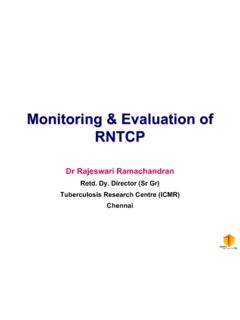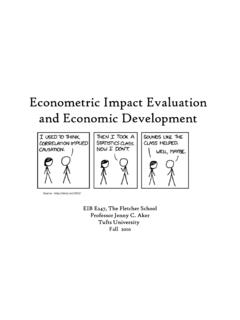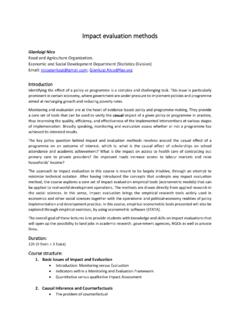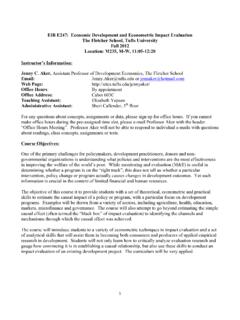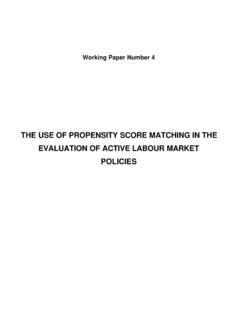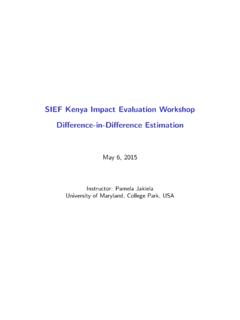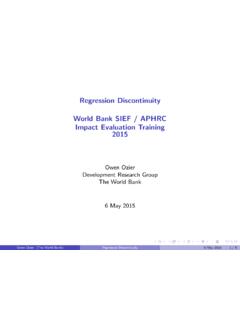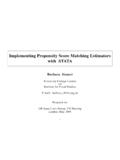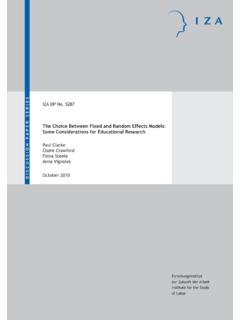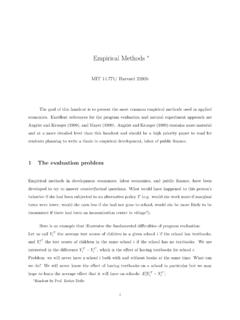Transcription of Impact Evaluation in Agriculture - CEGA
1 Impact Evaluation in Agriculture January 23 26, 2012 Center of Evaluation for Global Action International Institute of Tropical Agriculture Agricultural Technology Adoption Initiative 2012-01-19 ATAI-IITA Impact Evaluation Workshop 1 of 1 Table of Contents Biographies of List of Group Presentation Course Material Group Work: Drafting Theory of Change on Adoption and Case Study 1: How to Case Study 2: Threats to Experimental Exercise 1: Mechanics of Randomization ..25 Exercise 2: Sample Size and Group Presentation Checklist for Reviewing Randomized Evaluations of Social Impact Evaluation 2012-01-19 ATAI-IITA Impact Evaluation Workshop 1 of 1 Impact Evaluation IN Agriculture January 23 January 26, 2012 Day 1 9:00-9:10 Welcome, Introduction and Official Opening: IITA Emily Ouma, IITA 9:10-9:30 Introduction: Introductions to ATAI and CEGA Temina Madon, CEGA 9:30-10:45 Lecture 1: Using Randomized Evaluations to Test Adoption Constraints Chris Udry, Yale University TEA BREAK 11-12pm Lecture 2: Alternative Strategies for Randomizing Programs Karen Macours, Paris School of Economics 12-1 pm Lecture 3: Quasi-experimental Methods Chris Udry, Yale University LUNCH 2.
2 00 3:00pm Group Work: Drafting Theory of Change on Adoption and Impact TEA BREAK 3:15-4:45pm Panel: Overview of studies - Land Tenure (Karen Macours) - Insurance (Chris Udry) - Collectives and Cooperatives (Ruth Vargas Hill, IFPRI) 4:45-6:00 Group Work: Randomization Design - Case Study: Fertilizer and BlueSpoon Day 2 9:00-9:10 Recap: from Day 1 Temina Madon 9:10-10:00 Lecture 4: Power and Sample size for Clustered RCTs using examples Karen Macours TEA BREAK 10:10-11:00 Lecture 5: Managing and Minimizing Threats to Analysis Ruth Vargas Hill 11:00-11:45 Group Work: Managing Threats - Case Study: TNS Agronomy Training 11:45-1pm Lecture 6: Randomized Evaluation : Start-to-finish Chris Udry LUNCH 2:00-3:00 Lecture 7: Gender in Impact Evaluation Chris Udry 2012-01-19 ATAI-IITA Impact Evaluation Workshop 1 of 2 TEA BREAK 3:15-6:00 Group Work: Project Work - Work on Evaluation design Day 3 9-12pm STATA Session 1 (breakout): Beginner Introduction to STATA Advanced - Getting to know the dataset, Exercise: Sampling and power calculations - Changing the dataset, Exercise: Problem set and review LUNCH 1-3pm STATA Session 2 (breakout): Beginner Getting to know the dataset - Exercise: Sampling and power calculations Advanced Analysis - Exercise: Problem set and review TEA BREAK 3:15-5:30pm STATA Session 3 (breakout): Beginner Changing the dataset - Exercise: Problem set and review Advanced Analysis - Exercise: Problem Set and Review Day 4 9:00-11.
3 00 Group Work: Project Work TEA BREAK 11:10-12:00 Lecture 8: Scaling up successful interventions Karen Levy, IPA LUNCH 1:00-3:00 Group Presentations Each presentation 15 minutes + 15 minutes Q&A TEA BREAK 3:15-5:00 Group Presentations 5:00-5:15 Wrap up 2012-01-19 ATAI-IITA Impact Evaluation Workshop 2 of 2 Impact Evaluation IN Agriculture Workshop Lecturers Samuel Bazzi PhD Student University of California, San Diego Samuel Bazzi is a 4th year candidate at the University of California, San Diego. His research focuses on international migration, economic growth, and other topics in development economics including the welfare effects of cash transfers, the evolution of the firm size distribution, and the effect of economic shocks on conflict.
4 His primary thesis chapter explores the role of financial barriers to international migration from low-income settings. He has regional expertise in Southeast Asia and Brazil. Marshall Burke PhD Student University of California, Berkeley Marshall Burke is a PhD student in the Department of Agricultural and Resource Economics, University of California - Berkeley. His research focuses on agricultural technology adoption in Africa, and on the impacts of climate change on agricultural productivity and social outcomes in both the de veloped and developing world. Current fieldwork is in western Kenya. Willa Friedman PhD Student University of California, Berkeley Willa Friedman is a PhD Candidate in Economics at UC Berkeley. Her research spans the field of development economics, focusing on Sub-Saharan Africa.
5 Her current projects include: investigating behavioral responses to the availability of antiretroviral drugs including risk-taking, HIV testing, and investments in the future and children - in East Africa; testing the impacts of provider training on diarrhea treatment in Ghana; studying the Impact of education on political beliefs among girls in Western Kenya; and estimating the relationship between local economic conditions and participation in violence during the genocide in Rwandan. Before coming to Berkeley, Willa worked with the Abdul Latif Jameel Poverty Action Lab in Western Kenya. She has worked and studied in Uganda, Rwanda, Mali, Kenya, Burkina Faso, Cambodia, and Ghana. 2012-01-19 ATAI-IITA Impact Evaluation Workshop 1 of 3 Ruth Vargas Hill Research Fellow IFPRI Ruth Hill is a Research Fellow in the Markets Trade and Institutions division of IFPRI.
6 She joined IFPRI in 2007 as a post-doctoral fellow in the Director General s Office. Ruth has 9 years experience conducting research on rural markets in East Africa and South Asia, more recently focusing on formal and informal markets for insurance. She has worked on the design and implementation of index-insurance projects in Bangladesh, Ethiopia and India. Her work in Ethiopia and Bangladesh focuses on designing group-based index insurance schemes which combine group saving and lending with the purchase of formal insurance products. She also conducts research on market institutions and has been working with firms in Tanzania and farmers groups in Uganda to identify and implement interventions that improve the functioning of markets. Prior to joining IFPRI Ruth worked at the World Bank.
7 She received a PhD in economics from the University of Oxford in 2005. Karen Levy Senior Director Innovations for Poverty Action Dr. Karen Levy is a Senior Director at Innovations for Poverty Action. Her current work focuses on the development and implementation of school-based health policies and programs, particularly related to deworming. From 2006 through 2010, she served as Kenya Country Director for IPA. Since January of 2009, Karen has also served as Regional Director for Africa of Deworm the World. In this role she works with senior government health and education officials, providing technical and logistical support for the design, implementation, and monitoring of national school-based deworming programs. The first program she worked on in Kenya successfully reached over million children.
8 Karen received a BA with Honors from Brown University in 1994, an MSc with Distinction in Social Policy and Planning from the London School of Economics in 2000, and a PhD in Development Planning from the University of London in 2008. Karen was awarded the sole university-wide Bonnart-Braunthal Scholarship for her doctoral research, and a Public Service Fellowship from the Echoing Green Foundation for her leadership as a social entrepreneur. She has lived in Kenya for 14 of the last 18 years and speaks fluent Swahili. 2012-01-19 ATAI-IITA Impact Evaluation Workshop 2 of 3 Karen Macours Associate Professor Paris School of Economics Karen Macours is associate professor at the Paris School of Economics and researcher at INRA. Her research focuses on constraints to agricultural technology adoption and adaptation to climate change in developing countries; Impact of social programs on rural households human capital (early childhood development, education, and health), productive investments and economic activities; and the role of aspirations in poor households decision-making.
9 She is currently working on field experiments in Cambodia, the DRC, Haiti, and Nicaragua. Karen is an affiliate of CEPR and of JPAL Europe, and previously was an associate Professor at SAIS Johns Hopkins University. She also was a core team member of the World Bank s 2008 World Development Report on Agriculture for Development. She received her PhD in agricultural and resource economics from the University of California at Berkeley. Temina Madon Executive Director Center of Evaluation for Global Action Temina Madon is Executive Director of CEGA and provides leadership in the Center's scientific development, partnerships, and outreach. She has worked as science policy advisor for the National Institutes of Health Fogarty International Center, where she focused on enhancing research capacity in developing countries.
10 She has also served as Science and Technology Policy Fellow for the Senate Committee on Health, Education, Labor and Pensions, managing an extensive portfolio of global health policy issues. She holds a from Berkeley and an from MIT. Christopher Udry Professor of Economics Yale Universtiy Christopher Udry is the Henry J. Heinz, II Professor of Economics at Yale University. He is a development economist whose research focuses on rural economic activity in sub-Saharan Africa. He has conducted extensive field research in West Africa on technological change in Agriculture , the use of financial markets, asset accumulation and gift exchange to cope with risk, gender relations and the structure of household economies, property rights and a variety of other aspects of rural economic organization.


